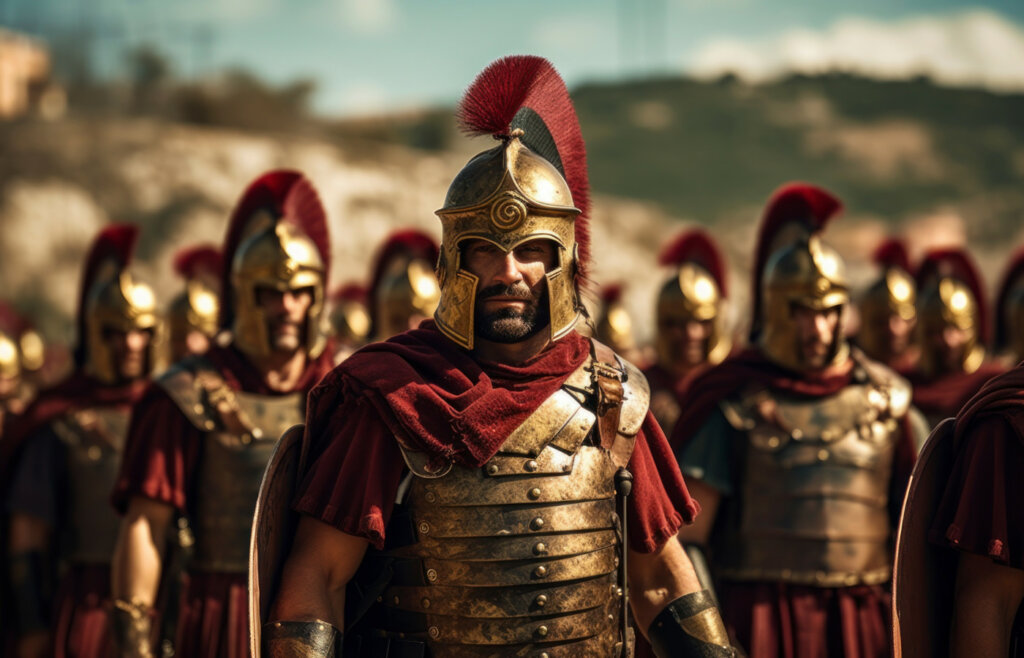The male species is a curious beast. Confusing. Almost impossible to decipher. Often needed to be understood. Now, a recent TikTok trend has added fuel to the fire.
It revolves around the topic of the Roman Empire. It’s not something that would immediately spring to mind when unlocking men’s leading internal thoughts.
Alas, the viral trend where women ask their boyfriends or husbands how often they think about the Roman Empire is captivating the globe, with the hashtag #romanempire gaining over 893 million views and counting on TikTok, with thousands of creators jumping aboard the Roman train (or horse and cart in this case).
The responses from men have been quite surprising, showing how seriously they think about it. As an almost 30-year-old male, I can say with unphased assurance that I NEVER think about the Roman Empire and find the whole trend wildly confusing and random.
@hannahkbrown Never once do I think of such things. How is this real?! #romanempire ♬ original sound – Hannah Brown
Sure, I’ve seen Gladiator a few times. The scene of Russell Crowe – aka the superbly named Maximus Decimus Meridius – returning to regain his vengeance against Emperor Commodus is a scene I can almost quote word for word.
Does that mean it graces my mind on a daily or weekly basis? Absolutely not.
Admittedly, I did reference the famously Greek Trojan Horse incident when asked about the growing trend. History was never a strong point for me.
According to the trend, it is believed that men should think about the Roman Empire three to four times a week to be considered “doing it right.” Excuse me?
Men also claim that they think about the Empire and even discuss it with their male friends, a conversation that I’ve personally never taken part in or overheard in the corners of dingy pubs over a pint of ale.
In one video, a man answered that he thinks about the Roman Empire thrice daily. He explained that there was so much to think about, which left his soon-to-be wife stunned. She’s not alone.
What’s the deal with Rome?
The reason behind men’s inclination towards the Roman Empire and why it is a constant topic of their thoughts is still unknown. However, one possible explanation could be the influence of the Roman Empire on the world.
@ambarrail This trend is incredible. Some of the best ones #romanempire #romanempirecompilation ♬ original sound – ambarrai
After all, the Roman Empire was known for creating a society that dominated the world.
In an interview with Rolling Stone, historian Mike Duncan points to Roman history as equivalent to military history and a topic that “is definitely something that is always going to be more of interest to men than women, just on a practical level.“
Duncan points to the heavy focus of “battled, and armies, and generals” and makes a comparison to “dads getting super into World War II, or the Civil War, or the Napoleonic era.” It “draws men to those kinds of military stuff.”
Another reason for men daydreaming about the Roman Empire could be the depiction of masculinity and associated authority. The Empire is often seen through the lens of warfare, politics, domination, elite power, and masculine sources.
As Duncan puts it, “every available option is available to us if we’re doing historical fantasizing,” which allows us to get into a mindset that can literally place us in the role of a Roman emperor, for example.
It’s pure fantasy, one which I’m sure many men transport themselves to because it was a time when men could be men. Men held significant power and control over currency in politics, society and family matters.
In its most basic form, Rome was a place where really mean guys did mean things, and nobody cared much about it. They actually thought it was cool and wrote books about it. Imagine that in today’s society.
Only free men in charge of their families could say what they wanted; everyone else had to be quiet. The people in order were mostly men, and they could punish their wives, kids, and slaves if they didn’t do what they wanted.
This male power and how Rome is depicted on TV and in movies make people feel nostalgic for a time in Rome that never really existed, except for a few rich people. The Roman Empire is seemingly romanticized for something it never was down to modern-day media.
The trend is making sense for me now…
If I were to think of the Roman Empire – from the content I’ve digested over my years on the planet – I would envisage being born into a fancy family and spoken with a British accent. I’m a powerful war hero and getting famous in history books.
Maybe I’m even part of a political family and take over from their warrior dad, fighting against enemy armies and marrying my own cousin (this is purely theoretical) to have more kids.
After a day of killing people, I can go home and relax in my fancy house by the sea, sipping Falerno wine sourced from the Campania region in southern Italy. Life is good.
Then, I wake up the next day and do it again.
Ahem.
The reality of the Roman Empire
It’s time to talk about the actual reality of the Roman Empire, based on statistical evidence uncovered by historians and people a lot smarter and well-educated than myself.
In reality, most people living in the Roman Empire would have come from much more modest backgrounds. During the Roman imperial period, around 1 in 4 individuals in Roman Italy were enslaved.
This means that a significant portion of the population lived in a state of forced servitude, devoid of personal freedoms and subject to the control of their owners.
Most of those free would have been rural peasants working as farmers or engaged in various forms of manual labor, such as artisans or craftsmen. Some individuals may have been freed from slavery and achieved a measure of independence, but they would still have faced significant challenges in their daily lives.
Life in ancient Rome was far from the glamorous and exciting portrayal often seen in movies and popular culture. Harsh climates, ongoing warfare, and frequent outbreaks of devastating plagues dictated the everyday existence of many people.
Instead of a cinematic storyline filled with bloodshed and glory, my reality would have most likely been toil, struggle, and enduring hardships. Talk about a buzzkill.
Rather than leading a heroic life, I would likely have perished as an anonymous farmer, painstakingly tending to a wheat field in the scorching Italian countryside.
Have you ever read something as underwhelming as that? Thought not.
@proddyc #stitch with @The Fellas Podcast #romanempire ♬ original sound – proddy c
The Roman Empire suddenly lost appeal when considering individuals’ immense challenges regarding malnutrition, disease, and lack of healthcare. Historian Walter Scheidel points out that even if Romans managed to survive into adulthood (which was not always guaranteed), their life expectancy was relatively short, with many dying in their 40s.
It is important to remember that the grand narratives and depictions of glory often associated with Rome primarily apply to the small elite ruling class or exceptional individuals who achieved prominence.
For the vast majority of the population, daily life was characterized by hardship, struggle, and a lack of luxuries commonly associated with the opulence of Rome.
My intention was never to dampen the viral trend but to gather a rough understanding. I’m still no further forward; I need some clarification.
Anyway, I’m off to watch Gladiator again.






